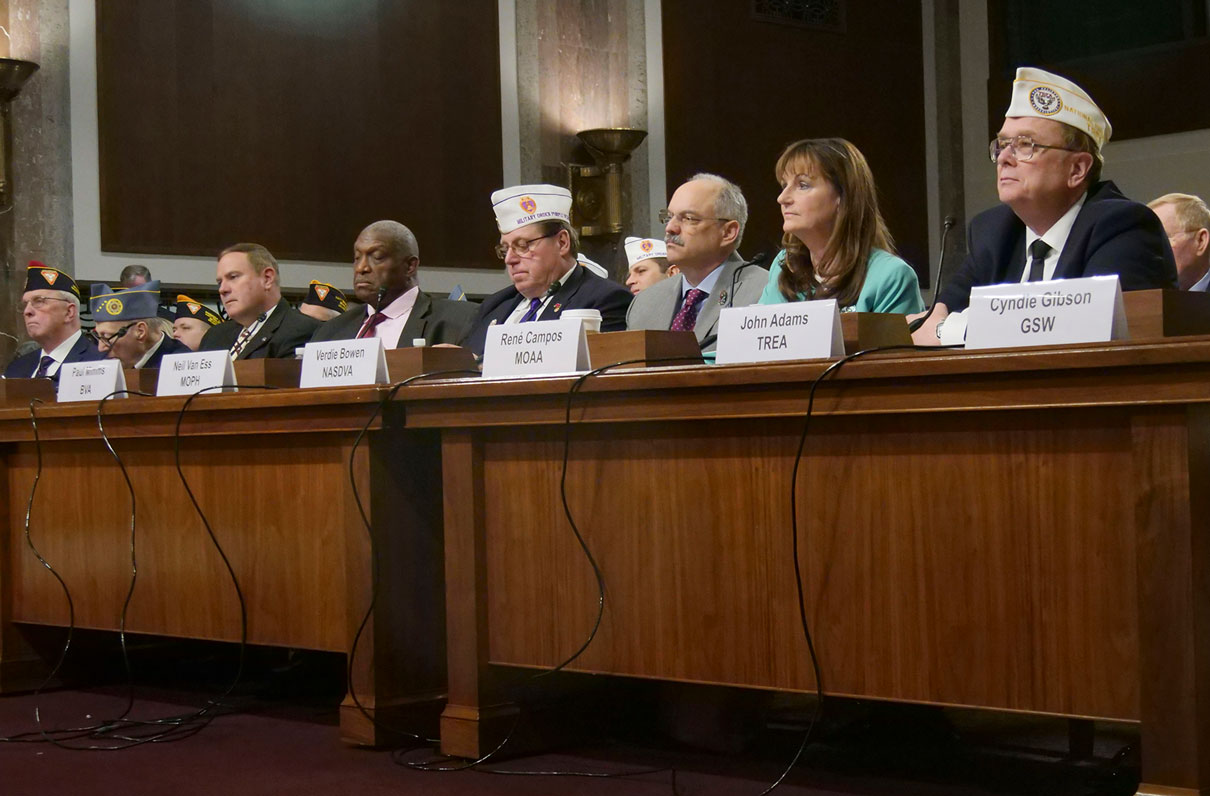MOAA urged lawmakers to strike a bipartisan deal to replace VA Choice and consolidate existing community-care programs during a Wednesday joint House-Senate hearing on Capitol Hill.
A year has passed without an agreement in Congress to replace the VA Choice program, which allows some veterans to seek care closer to home. Competing bills addressing reform have languished on the Hill - one in the House and one in the Senate - and veterans are ready to see resolution, said Cmdr. René Campos, USN (Ret), MOAA's senior director of Government Relations for veterans and wounded warrior care.
“Veterans and their families sacrificed so much during their service,” Campos told lawmakers. “To ask them to continue giving after service by funding their earned benefits or cannibalizing benefits to pay for another … program is asking them to go above and beyond what we expect.”
Rep. Tim Walz, Minnesota Democrat and retired Army sergeant major, and Sen. Jon Tester, D-Mont., stressed the importance of hearing from VSOs as lawmakers consider new VA legislation. Congress takes direction from VSOs “every step of the way,” Tester said.
MOAA was one of nine military and veterans service organizations to provide remarks during the hearing. In addition to community-care reform, MOAA also advocated for caregiver support, attention on women's health issues, and continued toxic-exposure research. Here's how Campos defined some of MOAA's top legislative priorities.
Reforming health care. Congress has never been closer to reconciling the differences in the community care bills: the Caring for our Veterans Act of 2017 in the Senate and the VA Care in the Community Act in the House.
MOAA and most other VSOs support the Senate version of the bill, which includes provisions to expand VA support and services for full-time caregivers and builds on VA Secretary David Shulkin's Community Access for Rewarding Experiences (CARE) proposal.
“We urge the committees to strike a bipartisan, bicameral agreement on legislation to enact community-care reform and ensure full funding for Veterans Health Administration resources,” Campos said.
Expanding caregiver support. MOAA would like to see caregiver benefits extended to veterans who served prior to 9/11. The need for caregiver support is great among all generations, Campos said. She shared the story about one MOAA member named Peter, an 81-year-old blind veteran who's 100 percent disabled.
“Peter recognizes the toll caregiving is taking on his wife,” Campos said. “He says, 'She's been my caregiver for over 20 years, and the burden is wearing on her but VA told me they don't have support services to help her.”
Sen. Johnny Isakson, R-Ga., said VSOs like MOAA help Congress “make decisions critical to VA.”
“On blue-water Navy and caregiver [benefits], we got the message loud and clear and we are working on it,” the committee chairman said. Blue-water Navy refers to the 90,000 servicemembers exposed to Agent Orange while operating off the coast of Vietnam.
Women's health needs. Roles for women in uniform continue to evolve, and Campos said the VA and Defense Department must prepare to serve their health needs.
MOAA recently teamed with United Health Foundation to study some of the health challenges facing female veterans. They found that women who served in the military were more likely to suffer from mental illness, cardiovascular disease, and other problems compared to female civilians.
Sen. Bill Cassidy, a Republican physician representing Louisiana, said he agrees. “Women have the privilege as men do to serve in some of these roles that were once just for men,” he said. “Our VA should respond to that.”
As part of this effort, Campos said MOAA recommends Congress pass the Deborah Sampson Act, which calls on the VA to carry out a three-year pilot program to assess peer-to-peer assistance for women leaving the military - especially for those who suffered sexual trauma or are at risk of becoming homeless.
Researching toxic exposures. Campos said Pentagon and VA officials must continue working together to study servicemembers' exposure to toxic materials in order to determine whether it's responsible for illnesses.
“It's unreasonable to require veterans to provide the scientific and medical evidence for their claim when that expertise resides within the government itself,” Campos said.
MOAA would like to see investment in federal resource on servicemembers' exposure to hazardous toxins so health care benefits can be provided when appropriate.
